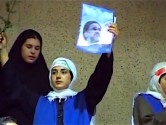


Under the Skin. The Films of Rakhshan Bani-Etemad
One of Iran’s most celebrated directors, Rakhshan Bani-Etemad (b. 1954) embodies two important trends in Iranian cinema – the nation’s long and diverse tradition of innovative documentary filmmaking, dating back before the 1979 revolution, and Iran’s perhaps surprising number of women directors, including Tamineh Milani, Niki Karimi, Samira Makhmalbaf and Bani-Etemad herself. Bani-Etemad began her career making documentaries for television before making a name for herself as a fiction filmmaker in the late 1980s with a series of pointed social satires. Nargess marked Bani-Etemad’s shift to a decidedly more personal mode of filmmaking and announced a new focus on the difficulties faced by various kinds of outsiders, and especially women, negotiating their roles in an unstable society. Bani-Etemad’s narrative films typically feature female protagonists and engrossing melodrama, romantic triangles, familial conflicts and the struggles of women to balance family, love and work. Setting her melodramas within resolutely gritty and war-torn settings peopled by petty criminals, drug addicts and loners, Bani-Etemad’s narrative films maintain a strong commitment to socially grounded realism. Refusing any trace of the sentimental, Bani-Etemad’s melodramas are striking examples of popular cinema used as a forceful probe into social problems long familiar—like the place of women—and relatively new, like the ravages of drug addiction. Over the last several years, as political reform, reaction and unrest have rippled across Iran, Bani-Etemad has returned to documentary to portray a country at the crossroads, taking the urgent pulse of an extremely young population confronting the discontents of the Islamic revolution, of women seizing a newfound freedom but also chafing at the lingering obstacles of religious tradition.












